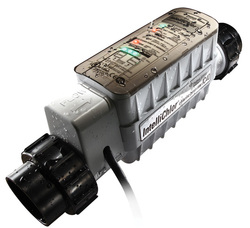If you've heard about the benefits of a saltwater pool you likely have other questions before you make an upgrade to the system. Several of the frequently asked questions are answered here.
Is it chlorine or salt that sanitizes the water?
Salt does not sanitize the water. Instead, after the salt is added to your pool it will electronically be converted to chlorine. As water passes through the chlorine generating cell, an low and safe electrical charge turns the salt that was previously added to the water into fresh sanitizing chlorine which is then dispensed evenly throughout the pool. Electronic chlorination has become a simple, safe and affordable alternative to using harsh, chemically-produced chlorine to sanitize pools and spas.
Is it chlorine or salt that sanitizes the water?
Salt does not sanitize the water. Instead, after the salt is added to your pool it will electronically be converted to chlorine. As water passes through the chlorine generating cell, an low and safe electrical charge turns the salt that was previously added to the water into fresh sanitizing chlorine which is then dispensed evenly throughout the pool. Electronic chlorination has become a simple, safe and affordable alternative to using harsh, chemically-produced chlorine to sanitize pools and spas.

Chlorine Generating Cell
The salt content in a salt pool is much lower than you may think. The salt content in a salt pool is around 3,500 ppm. Keep in mind, your tears contain 7,000 ppm of salt and the salt water in the ocean is 30,000 ppm. When you swim in a salt water pool, you’re swimming in a salinity level that’s much closer to your body’s natural salinity level. That’s why it feels so great.
What are the benefits of upgrading to a salt pool?
With a salt pool there isn’t a chlorine odor. The operating costs are low. Electronic chlorination in a salt pool pays for itself and is virtually maintenance free. Electronic chlorination is the ideal alternative to traditional factory produced chlorine for soft, silky-smooth water that is less abrasive to your skin. If you don’t like that “dried out” feeling after you swim then you might like a saltwater pool.
How common are salt pools?
Saltwater pools have seen a boom in sales over the past five years, according to pool industry experts. Saltwater pools are found at luxury hotels and resorts. Most newly constructed pools are saltwater pools. About a third of the pools I service are saltwater pools.
Now that I know the pros what are the cons?
The initial cost of installing the cell and the salt in the pool is significant. You won't "save" money on a saltwater pool as many pool services would have you believe because of the initial costs. You end up breaking even when you compare the cost of a saltwater pool vs. the cost of using traditional chemicals on a weekly basis. Also, the salt can possibly react with metal in the pool cover rails causing the metal to breakdown. I say "possibly" because I've haven't encountered this problem so far, it's rare. The effectiveness of a salt system is 100% dependent on balanced water conditions and, most importantly a proper pH. You must weekly keep a close eye on the chemistry of your pool water. As long as you do this a chlorine generator is a good choice.
Would I install a salt system in a pool of my own? Yes. I think it's worth it to have the consistent levels of chlorine in the water and the benefits of the soft water for friends and family. After all, over the life of the salt system you're going to pay about the same as you would for traditional chemicals.
Please call with any further questions. I’d be happy to work up a free estimate for you.
What are the benefits of upgrading to a salt pool?
With a salt pool there isn’t a chlorine odor. The operating costs are low. Electronic chlorination in a salt pool pays for itself and is virtually maintenance free. Electronic chlorination is the ideal alternative to traditional factory produced chlorine for soft, silky-smooth water that is less abrasive to your skin. If you don’t like that “dried out” feeling after you swim then you might like a saltwater pool.
How common are salt pools?
Saltwater pools have seen a boom in sales over the past five years, according to pool industry experts. Saltwater pools are found at luxury hotels and resorts. Most newly constructed pools are saltwater pools. About a third of the pools I service are saltwater pools.
Now that I know the pros what are the cons?
The initial cost of installing the cell and the salt in the pool is significant. You won't "save" money on a saltwater pool as many pool services would have you believe because of the initial costs. You end up breaking even when you compare the cost of a saltwater pool vs. the cost of using traditional chemicals on a weekly basis. Also, the salt can possibly react with metal in the pool cover rails causing the metal to breakdown. I say "possibly" because I've haven't encountered this problem so far, it's rare. The effectiveness of a salt system is 100% dependent on balanced water conditions and, most importantly a proper pH. You must weekly keep a close eye on the chemistry of your pool water. As long as you do this a chlorine generator is a good choice.
Would I install a salt system in a pool of my own? Yes. I think it's worth it to have the consistent levels of chlorine in the water and the benefits of the soft water for friends and family. After all, over the life of the salt system you're going to pay about the same as you would for traditional chemicals.
Please call with any further questions. I’d be happy to work up a free estimate for you.
Call today to start worry free service!
(707) 217-3533

